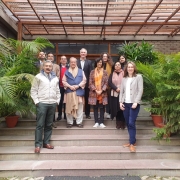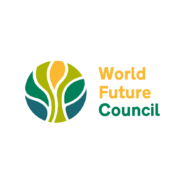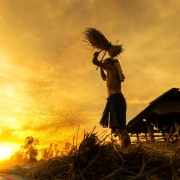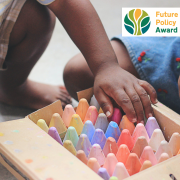World Future Forum / 15th Annual General Meeting
Shared Humanity – The Future We Want – This was the working title of the 15th Annual General Assembly of the World Future Council, which took place from 28 to 29 August. For two days, the Council exchanged views on the pressing problems of the world, the dissemination of good policies and the work programme of the World Future Council for the next years. Thanks to everyone for their active participation and great inputs. We look forward to the next Assembly!
Pontresina Declaration: The Future for Life on Earth
The World Future Council met for its 15th Annual General Meeting at Pontresina, Switzerland, on 28-29 August 2022. Surrounded by the Alps, forests and melting glaciers, we met to identify solutions to secure our common future. We received a warm welcome from the local community and the World Ethic Forum.
The World Future Council highlighted the importance of civil society and the need to protect and strengthen democracy. The Council urges the UN system and the international community to step up efforts to secure the universal right of all life to a clean, healthy and sustainable environment. Each year we have seen this effort become more urgently needed in view of growing pressures on nature, democracies, societies and economies from ecological devastation, extreme weather events, pandemics, armed conflicts, pervasive poverty and deprivation, alienation, violence, trauma and depression. Living through collapse, we are committed to regenerate our future.
The World Future Council calls on public and private sectors, and civil society to:
Regenerate ecosystems and livelihoods
- Make peace with nature in our political, legal and economic systems;
- Protect the rights and enable the work of civil society actors and Earth defenders;
- Deliver on commitments to protect, restore and regenerate ecosystems;
- Recognize, reward and promote the regenerative practices of local and indigenous communities for their sustainable resource use on their ecosystems;
- Prevent future zoonotic diseases by reversing wildlife habitat loss;
- Adopt 100 percent agroecology and regenerative food systems to protect the earth, combat hunger and malnutrition, and to help eradicate poverty; and
- Regenerate our oceans, while protecting at least 30 percent of the world’s oceans as highly or fully protected areas by 2030 and ensure the remaining 70 percent are sustainably managed by 2050, respecting indigenous fishing communities.
Stabilize the climate
- Address the food-water-energy nexus through promoting regenerative land use systems and fairly compensating farmers and Indigenous forest keepers for sequestering greenhouse gas emissions and mitigating climate change;
- End financial support for fossil fuels (subsidies and investments), uphold a fossil fuel non-proliferation treaty and cut greenhouse gas emissions at least in half by 2030;
- Fully implement the existing commitments on climate finance, incentives and low-carbon technology transfer for developing countries, especially those countries which are climate vulnerable, including Small Island States; and
- Strengthen legal protection of current and future generations of life on Earth for a sustainable climate and environment.
Transform economics and economies
- Pioneer practical pathways for transforming our economic systems towards wellbeing of all beings;
- Reward decision-making based on longer time horizons and visions; prices should tell the ecological and social truth;
- Penalize short-term speculation and adopt alternative discounting methods to more accurately assess the costs and benefits of investments in climate protection and ecosystem regeneration;
- Anticipate and prepare for black swan events, to be prepared for high consequence and low probability risks;
- Avoid unintended consequences by assessing technology choices – notably disruptive technologies – and their impact on societies, nature and democracy;
- End inequalities, defend the basic needs and livelihoods, reward resource conservation, ecological regeneration and sustainable livelihoods;
- Factor in the true cost of ecosystem regeneration into international trade and business patterns; and
- Change company laws to ensure that corporate and economic interests adhere to human rights, social justice and environmental protection principles.
Ensure the right to health
- Treat human health, planetary health and food and nutrition as inseparable and interconnected;
- Ensure that health is a fundamental human right and an integral part of human security;
- Implement universal health coverage, allowing all people and communities to have access to quality public health services, leaving no one behind. Children, refugees, internally displaced persons, elderly and persons with disabilities are amongst the most vulnerable and deserve special attention;
- Implement the human right to live in a healthy, safe and toxic-free environment with clean air, clean water and sanitation, clean soils and the right to healthy and nutritious food; and
- Implement working environments that are gender-sensitive, well-remunerated and safe.
Make peace
- Live up to obligations under the UN Charter to refrain from the use of force, to resolve conflicts peacefully and to observe the principles of international law;
- Commit to never launching a nuclear attack, starting by adopting no-first-use agreements;
- Eliminate nuclear weapons and other weapons of mass destruction globally no later than 2045, the 100th anniversary of the United Nations;
- Shift military budgets and investments to peace and human security. Much of the $2 trillion spent annually on militaries – including all of the $100 billion spent on the nuclear arms race – could be reinvested in environmental protection, public health, renewable energies, food security and the transition to green economies; and
- Ensure gender parity in all aspects relating to peacebuilding and conflict resolution.
Deliver on the rights of children, youth and future generations
- Connect the rights of the Earth, Earth democracy and Earth economics to the rights of children, youth and future generations, and incorporate the principle of intergenerational equity;
- Ensure the meaningful participation of children and youth in decision-making;
- Ensure that youth and children are key actors and agents of transformation;
- Institutionalize champions for future generations at all levels of decision-making, including support for the establishment of a UN Envoy for Future Generations; and
- Implement transformative education for co-creating regenerative futures as part of lifelong learning.
The World Future Council (WFC) works to pass on a healthy and sustainable planet with just and peaceful societies to future generations of life on Earth. To achieve this, we continue to focus on identifying, developing, highlighting and spreading effective, future-just policies and transformative pathways to face the current challenges.
The WFC has shown that a better future is possible by recognizing 66 exemplary policies from 40 countries with our Future Policy Awards and the active advocacy of its Councillors from around the world.
We strongly believe that mistrust and pessimism can be transformed into renewed hope, cooperation and solidarity of people, leaders and policy makers to take the right transformative decisions, working together as an Earth family.
Pontresina, 29 August 2022
The Good Council – The official podcast of the World Future Council
You need to load content from reCAPTCHA to submit the form. Please note that doing so will share data with third-party providers.
More InformationYou are currently viewing a placeholder content from amChart. To access the actual content, click the button below. Please note that doing so will share data with third-party providers.
More Information







